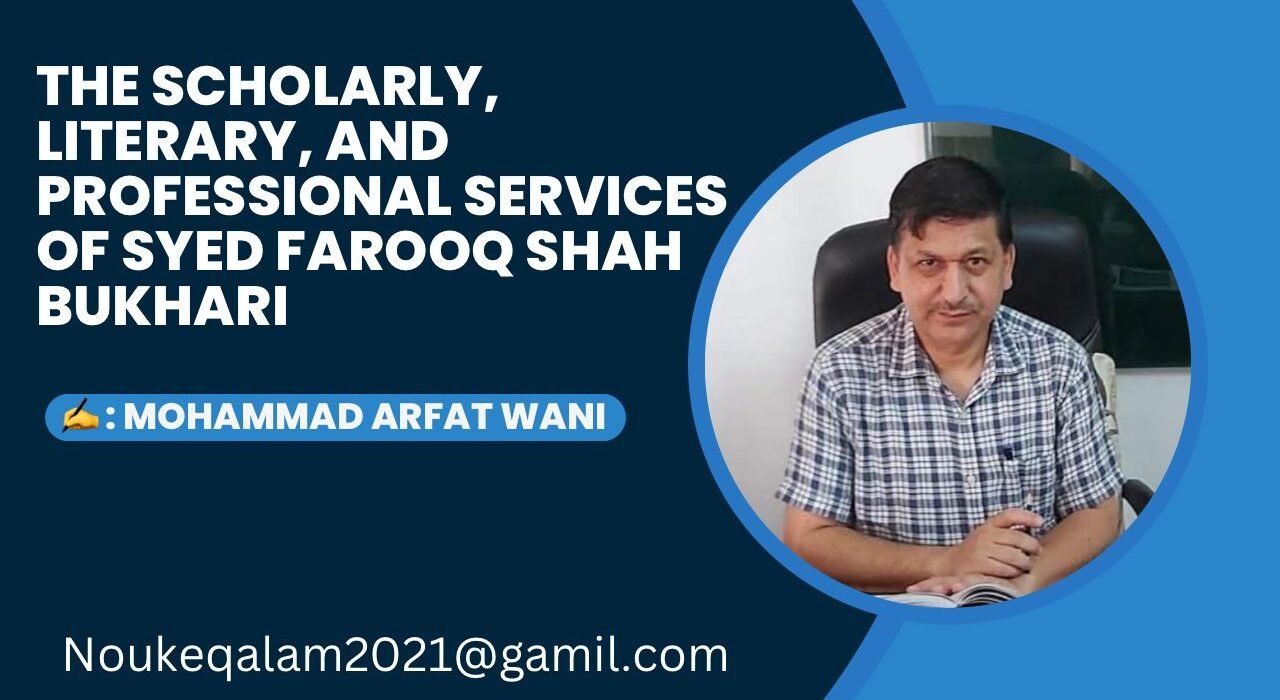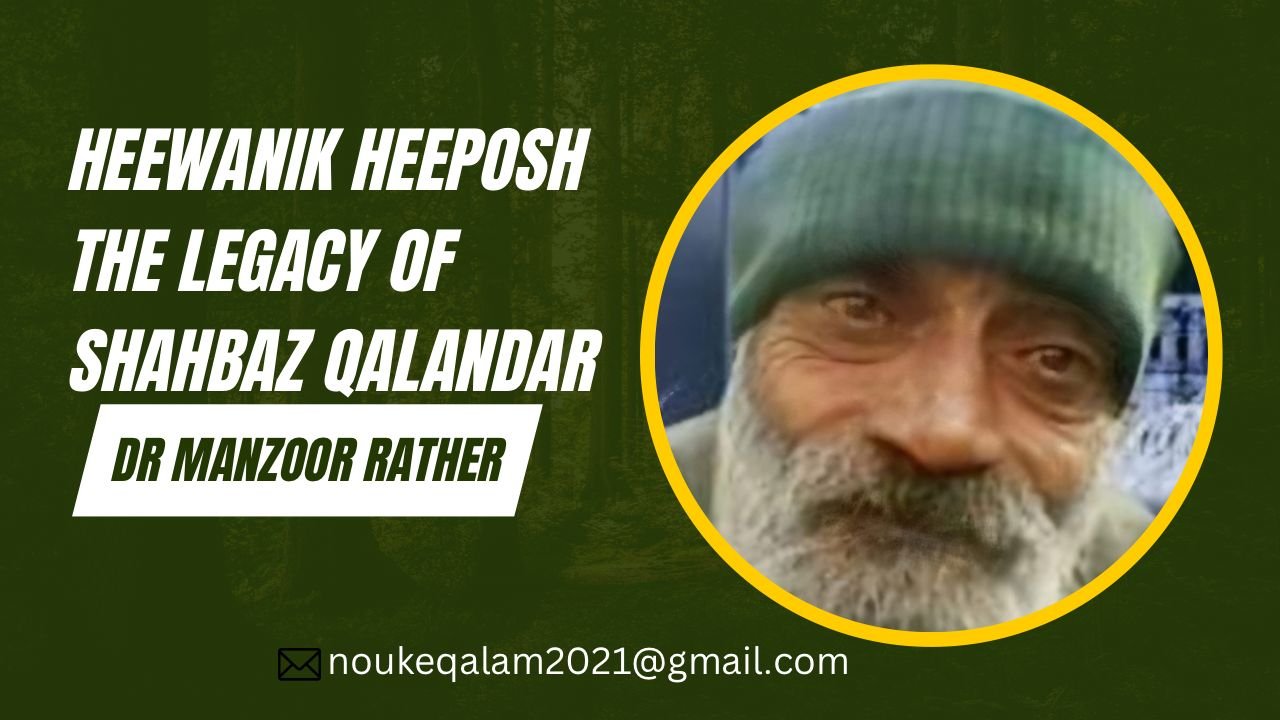Kashmir, often called the Valley of Paradise, is not only a land of natural beauty but also a cradle of literature, knowledge, and civilization. This sacred land has birthed many remarkable individuals whose contributions have enriched its culture and heritage. One such luminary is Syed Farooq Shah Bukhari, whose intellectual vision, leadership, and literary prowess have left an indelible mark on Kashmir’s cultural landscape.
Born on September 2, 1962, in the village of Medoora, Tral, Farooq Bukhari was raised in a family steeped in intellectual and spiritual values. His lineage traces back to Syed Mir Hassan Shah, also known as Lala Mir, a descendant of Syed Hassan Muntahi, who dedicated his life to serving humanity. His father, Ghulam Nabi Shah, was a renowned veterinary expert, and his family’s contributions to intellectual and spiritual life served as the foundation for Farooq’s own journey.
From a young age, Farooq stood out for his intelligence and curiosity. While other children played, he immersed himself in books and the world of current affairs. By the age of 13, his literary talent emerged, with articles being published in Aftab, a prominent newspaper of the time. His writing sparked widespread discussions, marking the beginning of a promising literary career.
Farooq’s academic journey was equally impressive. After excelling in his 10th-grade exams, he chose to pursue science in his 12th grade, not merely for grades but out of a deeper desire to understand knowledge. His intellectual pursuits continued with a B.Sc. in Agriculture, where he began to merge his love for academics with his passion for promoting the Kashmiri language.
In 1986, after two years of diligent research, Farooq completed a groundbreaking book on Biology, Hayatiyaat, in which he provided Kashmiri equivalents for over 300 biological terms. This work, published in 1988, was a significant milestone in the development of the Kashmiri language, earning accolades from the Cultural Academy, the Education Department, and the Government of India. Its success led to its inclusion in the Jammu and Kashmir Board of School Education (JKBOSE) curriculum for several grades.
Farooq’s contributions to academic literature did not stop there. In 1990, he authored Fundamental Physics Part One, which became a staple for students across the region. However, his most productive period came in August 1997 when he completed three landmark books in a single month. These works included Kashmiri Language Teacher, a grammar and translation guide for Kashmiri; Kasheeri Hend Kuly Katy, a comprehensive treatise on Kashmir’s flora; and Sheikh-ul-Alam’s Translation of the Pahari, showcasing his deep literary and historical research.
In 1999, Farooq passed the prestigious Kashmir Administrative Services (KAS) exam, securing a position as a Tehsildar, marking the start of his distinguished career in public service. His work was a seamless blend of academic achievement and governance, with his deep commitment to literature, education, and social reforms shining through.
Farooq’s dedication to knowledge was not confined to his literary and administrative roles. In 2006, he revamped and expanded his earlier works, producing comprehensive volumes that became integral resources for both students and scholars. One of his most notable contributions was Sonzili Hend Rang, a detailed study of Kashmiri linguistics, followed by Aawo Kashmir Likhna aur Padna Seekhain, a guide for learning the Kashmiri language.
In addition to his literary works, Farooq’s focus on law and governance led him to write Dastoor-e-Maal, a crucial text that provided clarity on revenue law, with several editions published over the years. His efforts to translate critical legal texts such as the Penal Code and C.R.P.C. into Urdu made legal concepts more accessible to the public, furthering his goal of bridging the gap between knowledge and everyday life.
His government service saw him holding key positions, including Tehsildar, Assistant Settlement Commissioner, Collector Land Acquisition (Defence), District Program Officer (ICDS), Regional Director Land Records, Deputy Commissioner Ramban, Special Secretary for the Revenue Department, Custodian General of Waqf Properties, and Joint Financial Commissioner. Each role saw Farooq exemplify dedication, honesty, and service, earning him the admiration of colleagues and the people he served.
Throughout his life, Farooq remained committed to the idea that knowledge and service to humanity are interconnected. His humility, despite his numerous accomplishments, became one of his most admired traits. He remained deeply grounded in his roots, always focusing on giving back to the community. His success became a source of inspiration not just for his family but for the entire region.
Farooq Bukhari’s influence extends beyond his literary works and administrative contributions. Through his presence on social media platforms like Facebook, Instagram, and YouTube, he has created a vast collection of educational videos. These videos, particularly his series Sani Goonmath, have captivated audiences by exploring the works of poets, historical figures, and cultural stories that have shaped Kashmiri identity. His content, characterized by thorough research and insightful narration, offers viewers a chance to delve deeper into the rich cultural heritage of Kashmir.
The impact of Farooq Bukhari’s life and work is profound. His dedication to the promotion of the Kashmiri language and culture, his role as an educator and writer, and his exemplary service in government positions have made him a luminary in the Valley. His story serves as a reminder of how a deep passion for knowledge, coupled with hard work and humility, can change the course of one’s life and leave an enduring legacy for future generations.
Farooq Bukhari’s life is a testament to the transformative power of knowledge and service. His writings and contributions have illuminated the path for countless individuals, and his work continues to inspire those who seek to better understand and contribute to the world around them. Farooq Bukhari’s journey is not just a personal success story; it is a beacon for the entire Kashmiri community, proving that with determination and dedication, one can indeed illuminate the darkest paths and light the way for others.
(Note: Mohammad Arfat Wani, a passionate writer, social activist, and medical student, hails from Kuchmulla Tral. His email address is wania6817@gmail.com)






